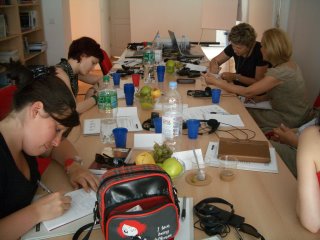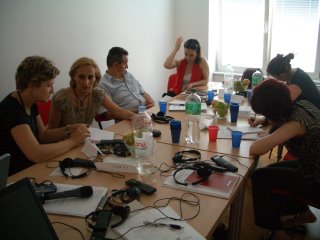Radio Sputnik, will it fly or will it die?
The editorial proposition, sustainable business plan, workflows and technical details for an imaginary radio station and internet site for Zagreb, Croatia, were pieced together during a 48-hour interactive workshop on New Media Strategies at the SHC HQ in Sarajevo, BiH.
The creation of the editorial, financial and technical framework for Radio Sputnik involved eight senior editorial and technical staff from media operations in Croatia, Serbia and Bosnia and Hercegovina.
 Participants and organisers of the workshop
Participants and organisers of the workshop
However, although Radio Sputnik, with its catchy slogan “will it fly or will it die”, never reached the launch pad, it was more than a piece of fun.
Before the exercise, Claus Solvsteen and I set out a series of editorial and business solutions that have been tried, tested and proven to work with some of the world’s leading media operations as well as with small, independent media organisations in transition and post-conflict countries.
Those attending the workshop then split into groups.
 Working on the editorial proposition for Radio Sputnik
Working on the editorial proposition for Radio Sputnik
Two examined the station’s core editorial proposition (CEP) to try to identify what Radio Sputnik’s editorial focus should be and how it should be different from its competitors.
They looked at issue-led journalism and how a responsible media operation should inform the public debate so that the audience can make educated choices in their lives.
They also explored how to create hundreds of original stories a year in order to free them from a dependency on news conferences and the wires.
Another two looked at who the audience should be and what future audience they could win.
They examined a variety of business models as they looked at ways of generating revenue, including advertisements, subscription, barter deals and sponsorship.
The third group looked at editorial workflows and the technical tools needed to deliver content to all the devices with which the users might want to receive Radio Sputnik's news.
Their brief was to ensure news was created once without reversioning and duplication so that it could serve the widest audience and be exploited for maximum revenue gain.
 Working out the details for a sustainable business plan
Working out the details for a sustainable business plan
The fourth group looked at how a website could be created to best showcase Radio Sputnik’s core strengths, attract and engage users, create fresh revenue opportunities and boost the brand.
All knew it was just an exercise, but all threw themselves into the process as if their lives depended on the financial survival of the mythical radio station.
What was clear at the end of the process was that far more information had been taken in, digested and then improved than is often the case in media training workshops.
The make-believe Radio Sputnik helped focus minds, ensure those taking part understood the issues at stake and helped participants appreciate the realities of building a financial sustainable and robust independent media operation.
The processed was helped by having a great team of high-quality, can-do, positive journalists and managers taking part in the workshop - they were a delight to work with.
Perhaps the slogan for Radio Sputnik should be changed to ‘Radio Sputnik, getting ready to fly’.
Participants:Iva Vukusic and Jelena Berkovic from
Radio 101 Zagreb, CroatiaAmna Popovac and Amela Rebec
Radio Studio 88, Mostar, BiHNejra Runic and Dusko Okjaca
PBS, BiHLarisa Rankovic
Ebart Media Documentation, Belgrade, SerbiaMedia Development Organisations: The Swedish Helsinki Committee for Human Rights and the
Media Development Loan Fund (MDLF)




<< Home